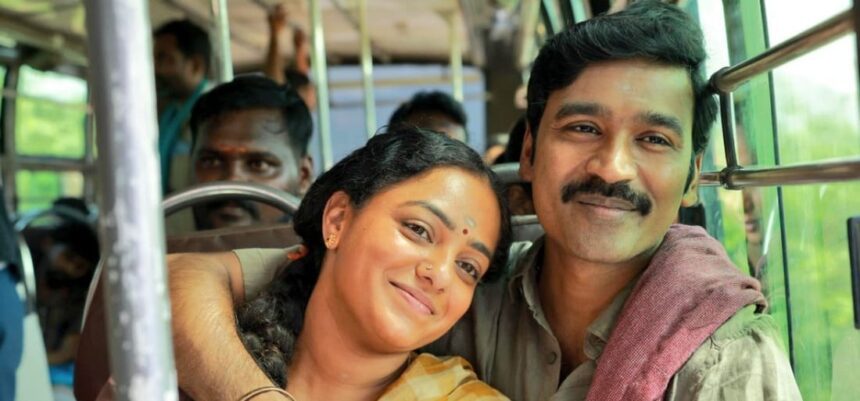In Idli Kadai, director and lead actor Dhanush attempts to blend two disparate narrative styles: a meditative exploration of the protagonist’s search for his inner self and a conventional masala entertainer characterized by simplistic crowd-pleasing elements. While the film struggles to harmonize these elements, the meditative segments offer a degree of fulfillment.
The Meditative
Rajkiran plays Sivanesan, the earnest proprietor of a modest idli shop in a village, firmly establishing the film’s meditative aspect. For Sivanesan, work signifies worship, positioning his character as the spiritual backbone of the narrative. In contrast, his son Murugan (played by Dhanush) departs the village seeking better economic opportunities but is ultimately compelled to return due to unforeseen circumstances. This return presents an opportunity for Murugan to rediscover his purpose.
The narrative could have easily succumbed to clichés or overly romanticized village life. However, Dhanush sidesteps these pitfalls, introducing folkloric and surreal elements to shape Murugan’s internal journey. A notably brilliant sequence depicts a surreal dream that provokes introspection, showcasing Dhanush’s prowess as a director. As Murugan begins to operate the idli shop with the same dedication as his father, he discovers inner peace—these moments represent the film’s strongest sequences and lead effectively to the intermission.
Once Murugan’s spiritual quest reaches its conclusion, Dhanush appears uncertain about advancing the second half and pivots to a more conventional approach.
The Mindless
Murugan’s spiritual journey can only sustain a portion of the film, revealing that these segments lack the conventional “mass” appeal expected in commercial cinema. Consequently, the narrative introduces a family of stereotypical antagonists. Sathyaraj, Arun Vijay, and Shalini Pandey portray a wealth-laden family that disrupts Murugan’s path.
Shalini Pandey’s character, Meera, is supposedly in love with Murugan; however, her portrayal lacks emotional depth. Arun Vijay plays Ashwin, who displays aggression but shifts to a softer demeanor almost instantaneously. Sathyaraj, as their father, meanders aimlessly through the storyline along with his troublesome children. This constructed family dynamic feels artificially forced, lacking the authenticity even seen in mediocre television dramas. Additionally, the film incorporates an unrelated 1980s-style murder mystery subplot and expects audiences to accept that these antagonists somehow contribute to Murugan earning the villagers’ trust.
Dhanush, as a writer, seemingly hoped these villainous characters would infuse necessary masala thrills, but they ultimately fall flat.
The Mix
To tie the two narrative strands together, Dhanush introduces a backstory with Sivanesan’s commitment to non-violence, which Murugan is meant to inherit. Nonetheless, this topic is handled inconsistently, coming off as contrived.
Despite this, the meditative sections remain unaffected by the masala elements; the film’s failure to intertwine them may paradoxically preserve the integrity of its tranquil core. Nithya Menon stands out in her role as Kayal, and Parthiban delivers a notable performance as a minor police officer.
The film’s soundtrack, produced by G.V. Prakash Kumar, lacks the impact of their previous collaboration in Nilavuku En Mel Ennadi Kobam (2025), with only a couple of memorable songs. The background score, as is commonplace in contemporary cinema, feels overbearing and excessively loud.
Cinematographer Kiran Koushik navigates the film’s emotional tone inconsistently, only achieving success in bits and pieces.
As the film concludes on a feel-good note, it might have resonated more deeply if the meditative and masala narratives had blended more seamlessly. For now, only the meditative sequences merit commendation, while the masala segments can be overlooked.
Rating: 2.5 stars out of 5.
Tags: Idli, Kadai, review, meditative, mindless
Hashtags: #Idli #Kadai #review #Part #meditative #part #mindless










